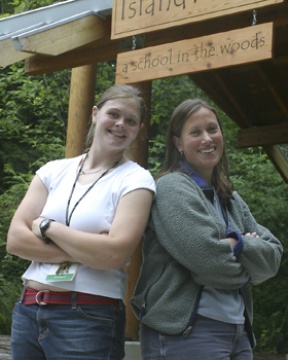Alison Swain and Hilary Benson complete IslandWood’s graduate residency.
This year’s graduate studies class at IslandWood has a notable distinction.
Two of the 11 students of the Graduate Residency in Education for Environment and Community program are Bainbridge High School alums.
Alison Swain and Hilary Benson are among the students who will receive a Certificate in Education, Environment and Community through the University of Washington Education Outreach. Commencement will be at 2 p.m. Sunday at IslandWood.
The other graduate students come from points across the country, including Illinois, Kentucky and New Hampshire, and all have an undergraduate degree and teaching experience.
“I would’ve come to this program whether I was from this area or not,†Benson said. “It’s a very progressive, new wave of education. We enhance what the students are learning in the classroom.â€
Benson, 25, grew up in Kingston and transferred to Bainbridge High as a sophomore. She graduated from Bates College in Lewiston, Maine, with a degree in education and environmental studies in 2003. She then moved to Washington, D.C., to teach primary education at a Montessori school.
After high school, Swain, 26, went to Williams College in Williamstown, Mass., where she majored in American Studies, Race and Ethnicity. After graduating, she taught eighth-grade English and history at a private school in Atlanta.
Both women heard about the 3-year-old IslandWood program from their mothers. Neither thought they’d ever move back to the island, but they soon were glad they did.
“You definitely get training in current education standards, like the WASL, but you’re not tied down to it,†Swain said. “You really hone your teaching skills when you’re teaching the same thing all these different ways.â€
Every subject taught at IslandWood is integrated – language arts, culture, history and science – and two-thirds of the work is done outdoors. The education program it offers fulfills a 1990 state mandate for public schools to provide outdoor education.
“Just because you see a picture of a plant, you can’t understand photosynthesis,†Swain said. “Students here go into the element and see how it’s all connected. It becomes more meaningful for them and they retain it better.â€
The biggest misconception, the graduates said, is that IslandWood is “just†an environmental center.
Aldus software founder and PageMaker inventor Paul Brainerd and his wife, Debbi, purchased the 255-acre school site at Port Blakely in 1998. Their goal was to create a model for education reform, a place where students and teachers could stay and integrate lessons in science, math, art, writing, teaching and culture in an outdoor environment.
This year, 54 schools participated in IslandWood’s signature four-day School Overnight Program for fourth-, fifth- and sixth-graders, their teachers and chaperones. Almost half of the youngsters are from minority populations.
The graduate school training Swain and Benson received made them realize their destiny does not lie along the traditional education path. The IslandWood program is based on hands-on experience, which is eye-opening for the city students they teach.
“They come from an urban environment and explore nature with an environment element,†Benson said. “It puts it in a context for them.â€
Each graduate student is the contact for two schools and teaches a few lessons in those classrooms before the overnight retreat begins. They rotate in graduate groups called cohorts and catch up on their own schoolwork, which includes presentations, independent projects and the occasional quiz.
On-site classes are taught by full-time IslandWood faculty. The curriculum covers educational theory and methods, environmental science, technology, the arts and nonprofit administration.
In August, 20 students will make up the 2005-06 graduate program, the largest class to date. The center recently was awarded its first major bequest: $500,000 to start a graduate endowment scholarship fund, to go along with the $5,000 it previously earmarked for scholarships.
The credits earned by the students complete the first year of study toward master’s degrees at UW and City University. Graduates usually either complete a master’s degree program or accept a teaching position.
“We have to relate a lot of our assignments in class to our fieldwork,†Benson said. “A lot of what we do is tied to our teaching.â€
This fall, Benson will join the teaching staff at the Montessori Country School on Bainbridge. Swain will continue working on her master’s degree in education through the UW and live and work at IslandWood as a campus host.
As idyllic as IslandWood is – with its forested setting, diverse ecosystems, state-of-the-art learning labs and architecturally arresting buildings – the school is not for everyone.
“It’s not for big university types,†Swain said.
The two leave the graduate program with many special memories. Topping the list for Swain are the English-as-a-Second Language students.
“It can be so intimidating for them. But there’s so much hands-on here, kids can open up and language isn’t a problem,†she said.



